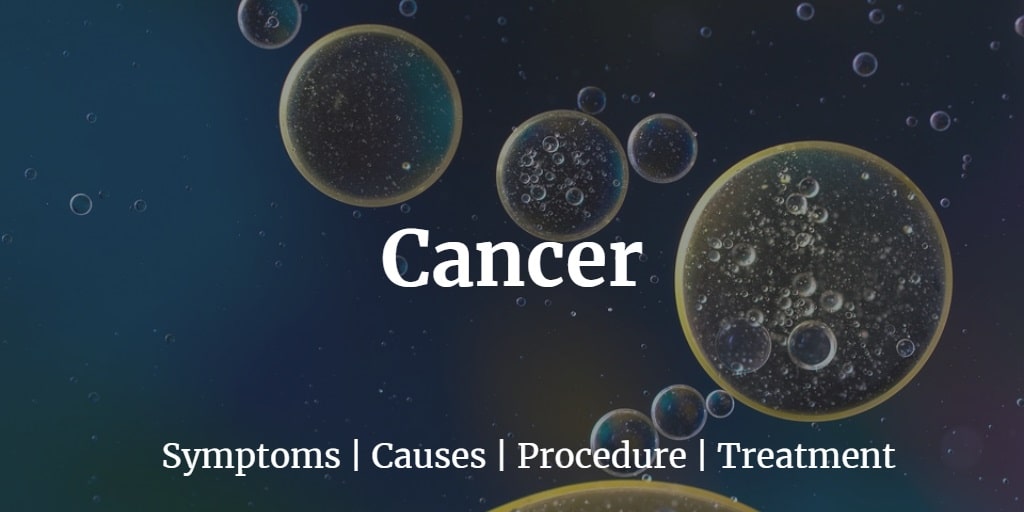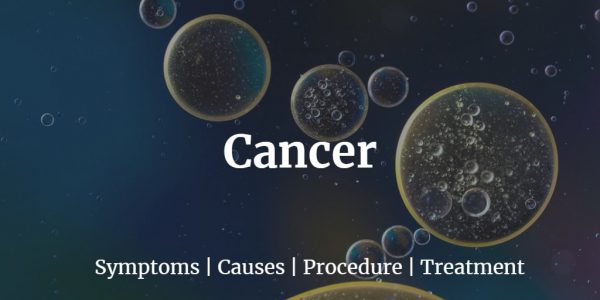
Do you know that cancer is the second leading cause of death in the United States? According to the American Cancer Society, an estimated number of 1.8 million new cancer cases will be diagnosed and 606,520 people with cancer will die in the U.S. in the year 2020. Cancer can be treated effectively only when diagnosed and treated at an earlier stage. In most cases, the symptoms of cancer do not show up at an earlier stage. So we highly recommend everyone to get tested for cancer screening at least once every two years.
The article covers all the significant topics related to cancer like cancer test cost, different types of cancer, symptoms, treatment, risks, prevention, and how to get tested for cancer screening tests.
- Cancer test cost.
- What is cancer?
- What are the causes of cancer?
- Common types of cancer
- What are the signs and symptoms of cancer?
- How is cancer diagnosed?
- Are there any side-effects associated with cancer treatment?
- Is cancer curable?
- How to treat cancer?
- How to prevent cancer?
- Provider locations
For our readers, who are more interested in knowing the cancer test cost beforehand, we would like to begin with that section.
How much does the cancer test cost?
Cancer test cost ranges between $39 and $629 in different labs and facilities across the U.S. The cancer test cost also depends on your choice of testing for specific cancer tests such as Prostate Specific Antigen (PSA) test for prostate cancer, etc. or testing for cancer as a whole package such as male cancer screening package and female cancer screening package.
No prior appointment is required. Compare the price, order your test online and visit the nearest lab during lab business hours. Complete the procedure and get the results in your email in 2 to 3 business days. Doctor consultation is also available for further treatment or any kind of medical advice.
The following table shows the Cancer test cost at one of our partner laboratories (CLIA – Certified) network located across the U.S.
Name of our Partner Labs | Book Online |
Personal Testing Lab
| Starting from$39 |
Cancer testing
Testing for cancer is a two-step process.
1. Cancer screening test: This test is done to detect the presence of cancer cells in the body. Screening test results have a positive or negative outcome.
2. Cancer advanced testing: When the cancer screening test results are positive, advanced diagnostic tests will be ordered by your physician to know the exact stage of the cancer disease.
Cancer test cost with insurance
Most of the health insurance policies in the U.S. cover the cost of both the screening and advanced diagnostic tests. However, the coverage offered by private health insurance policies and national health insurance programs like Medicare and Medicaid varies widely. So we recommend you to check the coverage of your plan with the insurance company before getting tested.
Our cancer testing providers do not accept any health insurance. But, on request, they can provide you with an itemized receipt containing all the details like the name and code of the test, and CPT code which is necessary for insurance reimbursement purposes.
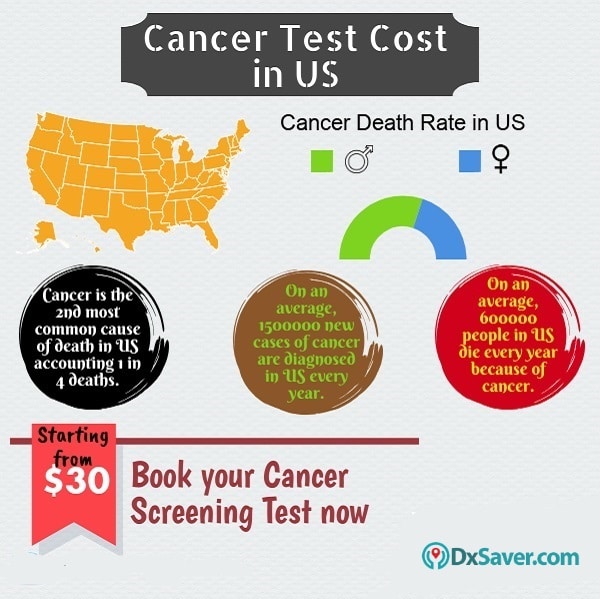
What is cancer?
Cancer is an uncontrolled growth of abnormal cells in any part of the body. It starts to develop when the normal body mechanism stops working. Generally, the human cells grow and divide when the body needs them. The old damaged cells die and give way to new cells that are formed by cell division. Sometimes the old cells do not die and grow out of control which forms new, abnormal cells called cancerous cells. These cancerous cells might form a mass of tissue called a tumor. As these tumors grow, some cells travel through the bloodstream to other parts of the body forming new tumors.
What are the causes of cancer?
Cancer can be caused by any of the following factors.
- Biological factors such as age, gender, or inherited genetic defects.
- Environmental factors like UV radiation or other metallic compounds.
- Occupational risk factors like some plastic chemicals, tar, pitch, etc.
- Lifestyle-related factors like tobacco and alcohol.
- Microorganisms such as bacteria, hepatitis virus, and papillomavirus.
Common types of cancer
In the United States, the most common cancer diagnosed in women is breast cancer and in men, lung cancer, and prostate cancer. Some of the common types of cancer are
1. Breast cancer
Breast cancer is the most common cancer diagnosed in women and may occur rarely in men. It usually starts from the milk-producing glands of the breast. Hormonal, lifestyle and environmental factors increase the chances of breast cancer. Breast lumps are the first signs of breast cancer. Signs of breast cancer are
- Change in the breast size
- Nipple discharge
- Inverted nipple
- Peeling or scaling of the breast skin
- Lump in the breast or armpit
- Redness or unusual warmth in the breast
We recommend every woman above the age of 40 to do breast cancer screening test at least once a year. Mammography or MRI Breast can be done to detect breast cancer.
2. Lung cancer
Lung cancer is the leading cause of cancer death in both men and women. Cancer can arise in any part of the lung and the chain-smokers are at a higher risk of getting lung cancer. Passive exposure to smoking can also cause lung cancer. Lung cancer can cause severe complications like shortness of breath, bleeding in the airway, pain in the lungs, and fluid accumulation in the chest. The common symptoms of lung cancer are
- Sudden cough
- Coughing up blood
- Breathing problem
- Pain in the chest
- Unusual weight loss
- Bone pain
- Headache
3. Prostate cancer
Prostate cancer is one of the most common types of cancer among men. The prostate is a small walnut-sized gland and it produces the seminal fluid that nourishes and transports the sperm. This cancer does not show any signs or symptoms at its early stage but it can be cured at the early stage of infection. Some of the symptoms in the advanced stage of prostate cancer are
- Urination problem
- Blood in semen
- Erectile dysfunction
- Pain in the bone
- Inconvenience in the pelvic area
If left untreated, prostate cancer might spread to other parts of the body causing bladder cancer and bone cancer.
4. Colon cancer
Colon cancer is the third most common cause of cancer deaths. It occurs when the tumors start growing in the large intestine. Sometimes it may occur simultaneously with rectal cancer called colorectal cancer. Rectal cancer is the growth of tumors in the rectum that is present closer to the anus. A person with colon cancer does not show any symptoms until the advanced stage. Some of the common symptoms of colon cancer are
- Diarrhea
- Changes in stool consistency
- Bleeding in the rectum
- Abdominal pain
- Painful bowel movements
- Weakness and fatigue
- Weight loss
- Anemia–Iron deficiency
Regular screenings are recommended to detect colon cancer at an early stage.
5. Bladder cancer
The bladder is the organ located in the lower abdomen and it collects the urine produced by the kidneys. This cancer starts when the cancerous cells grow in the bladder. The exact cause of bladder cancer is unknown. But smoking increases the risk of bladder cancer. Many people with bladder cancer can have blood in their urine and other common symptoms are
- Back pain
- Frequent urinating
- Pain in the lower abdomen
6. Skin cancer
Skin cancer is one of the most common cancers found in the U.S. According to the American Academy of Dermatology (AAD), approximately 9500 people are diagnosed with skin cancer every day. Skin cancer occurs because of exposure to UV radiation. However, this is not the only reason for skin cancer. Even skin cancer can occur in the areas not exposed to sunlight. So we recommend regular check-ups when you find bumps on the skin, the appearance of a new mole or unusual changes or bleeding in the existing moles, dark lesions, and red patches on the skin.
7. Pancreatic cancer
The pancreas is a gland located behind the stomach. It produces enzymes that help digestion. Generally, pancreatic cancer begins with the cells producing hormones. It is rarely detected in its early stages. But when it is left untreated, it spreads to other parts of the body making the condition worse. People who smoke or have chronic diabetes are more vulnerable to pancreatic cancer. The signs and symptoms of pancreatic cancer are
- Jaundice
- Nausea
- Vomiting
- Abdominal pain
- Swelling in the abdomen
8. Throat cancer
Throat cancer refers to the cancerous cells in the throat, voice box, or tonsils. Excessive tobacco and alcohol usage can increase the risk of getting throat cancer. Common symptoms of throat cancer are
- Cough
- Voice change
- Ear pain
- Difficult to swallow
- Soreness in the throat
- Unusual weight loss
9. Cervical cancer
Cervical cancer occurs in the cervix cells, the lower part of the woman’s uterus that connects the uterus with the vagina. Human Papilloma Virus (HPV), a sexually transmitted infection is the main cause of cervical cancer. Early-stage of cervical cancer does not show any symptoms or signs. People with advanced cervical cancer experience the following symptoms.
- Vaginal bleeding after sexual intercourse
- Abnormal vaginal discharge
- Pain during intercourse
The risk of getting cervical cancer can be reduced by regular screening tests and by vaccinating against the HPV infection.e red blood cells are called reticulocytes. Reticulocyte count shows if the bone marrow is producing enough red blood cells.
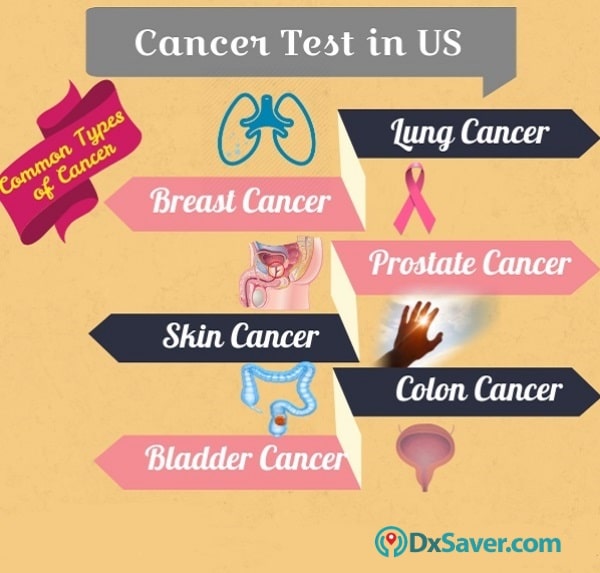
What are the signs and symptoms of cancer?
Symptoms of cancer vary based on the type of cancer present. However, cancer affected people do not show any significant symptoms in the early stage of infection. So we recommend you consult the physician for further evaluation if you experience the following symptoms.
- Continuous cough
- Change in bowel habits
- Continuous diarrhea
- Anemia
- Blood in the stool
- Lump in any part of the body
- Problem while urinating
- Blood in the urine
- Digestion problems
- Abnormal vaginal bleeding or discharge
- Fever
- Sweating at night
- Itching in the genital areas
- Sores
- Unusual back pain and abdominal pain
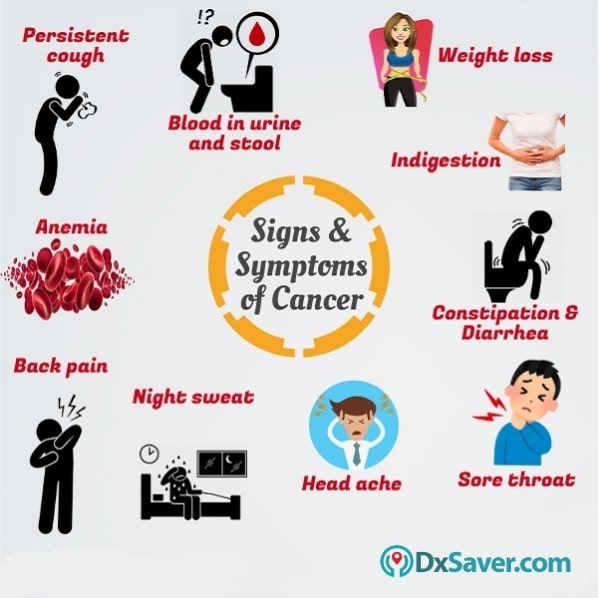
How is cancer diagnosed?
Regular cancer screening increases the chances of detecting cancer at the early stages. There are higher chances of recovery if diagnosed and treated at an early stage. Blood samples are mostly taken for cancer screening tests.
List of blood tests to detect cancer
The following are some of the screening blood tests done to detect cancer.
| Name of the blood test | Purpose |
| CBC test and platelet count | Routine check-up and detects variations in blood cells |
| Prostate-Specific Antigen (PSA) blood test | Detects prostate cancer |
| Male cancer screening blood test (package) | Detects the most common cancers affecting men |
| Female cancer screening blood test (package) | Detects the most common cancers which affect women |
| PSA Free: Total ratio blood test | Follow-up treatment for men diagnosed with prostate cancer |
| CEA blood test | Diagnosing and monitoring colorectal, pancreatic, breast, ovarian, and lung cancer |
| Fecal occult blood, Immunoassay blood test | Recommended for people with a family history of having colon cancer |
| Alpha-Fetoprotein (AFP) blood test | Detects liver cancer, testicular cancer, and germ cell tumors |
| CA 19.9 blood test | Detects pancreatic and esophageal cancer; Monitoring their therapy |
| Cancer Antigen, CA 27.29 blood test | Monitors therapy for breast cancer |
| Cancer Antigen, CA 15-3 blood test | Monitors the response to the treatment of breast and ovarian cancer |
| Calcitonin (Thyrocalcitonin blood test) | Detects thyroid cancer |
| Vascular Endothelial Growth Factor blood test | Assess the risk and family history of having cancer |
How to treat cancer?
There are many methods to treat cancer but the treatment depends on the type and stage of cancer. Most people have multiple treatments for cancer while some have a single treatment. The different types of cancer treatment are
1. Surgery
Surgery is a procedure done to remove the cancer present in any part of the body by the surgeon.
2. Radiation therapy
This therapy uses high radiation doses to destroy cancer cells and shrink tumors.
3. Chemotherapy
It is the most commonly used therapy that uses drugs to destroy cancerous cells.
4. Immunotherapy
It is a type of cancer treatment that helps the immune system to fight against cancer.
5. Targeted therapy
This cancer treatment targets the changes in the cancer cells which help them to grow, divide and spread.
6. Hormone therapy
It is a type of cancer treatment used commonly for breast and prostate cancer that uses hormones to grow. Hormone therapy helps to slow or stop the growth of cancerous cells.
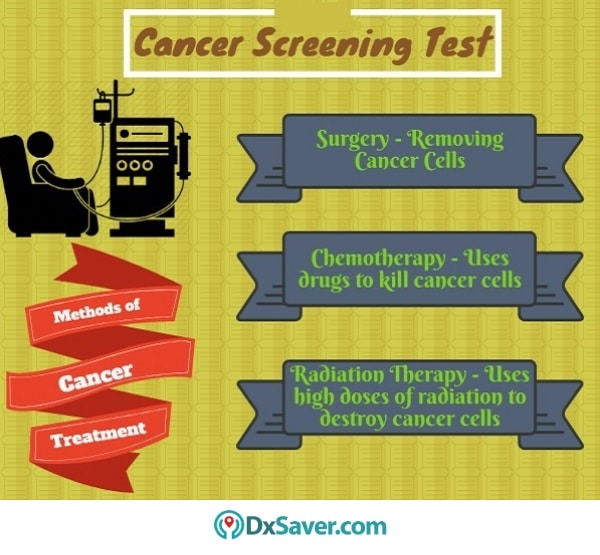
Are there any side-effects associated with cancer treatment?
Different types of cancer treatment can cause different side-effects when they affect healthy tissues. You should inform your physician when you start noticing the following side-effects after the cancer treatment.
- Anemia
- Loss of appetite
- Constipation
- Diarrhea
- Fertility issues
- Loss of hair
- Memory problems
- Neurological problems
- Swelling
- Sleeping problems
- Sexual health issues
- Problems in the urinary bladder
Is cancer curable?
No one can guarantee that cancer can be cured completely. Generally, doctors say a person who is cancer-free for 5 years after cancer diagnosis and treatment has better chances of recovery. Prostate cancer, thyroid cancer, testicular cancer, and breast cancer (early stage) are the types of cancer that have stronger hopes of recovery as the tumors grow slowly and can be treated effectively when diagnosed at an early stage.
How to prevent cancer?
The following ways might help you to reduce the risk of getting cancer.
- Avoid smoking and drinking
- Eating a healthy diet
- Regular vaccinations
- Regular cancer screenings and routine health check-ups
Provider Locations
The cancer screening tests can be done in any of the following locations across the U.S. by visiting the nearest lab. To know the cancer test cost, refer to the first section of the article.
- Alabama
- Alaska
- Arizona
- Arkansas
- California
- Colorado
- Connecticut
- Delaware
- Florida
- Hawaii
- Georgia
- Idaho
- Illinois
- Indiana
- Iowa
- Kansas
- Kentucky
- Louisiana
- Maine
- Michigan
- Minnesota
- Mississippi
- Missouri
- Montana
- Nebraska
- Nevada
- New Hampshire
- New Mexico
- North Carolina
- North Dakota
- Oklahoma
- Oregon
- Pennsylvania
- Puerto Rico
- South Carolina
- South Dakota
- Tennessee
- Texas
- Utah
- Vermont
- Virginia
- Washington
- West Virginia
- Wisconsin
- Wyoming
Frequently Asked Questions
Will insurance cover my testing cost?
No, insurance will not be covered in the billing. However, they will provide you a receipt for insurance reimbursement purposes.
How should I book my appointment?
You can choose the most suitable provider from above and make an appointment by following the instructions mentioned by them.
Can I cancel my lab test order?
Yes, you can cancel your lab test order anytime before your testing. A refund will be initiated after deducting the cancellation fee. However, cancellation is at the discretion of the provider.
Do the providers offer result interpretations?
Yes, a few providers may provide doctor consultation who will take you through the results and provide clarification if needed.
How do I receive my report?
To ensure your privacy, the test report will be mailed to you by the provider.
Other topics you may be interested in:-
- Hepatitis B Symptoms, Causes, Treatment, Prevention, and Risks
- Types of STD that causes dry skin
- How Much Does At-Home COVID-19 Home Test Kit Cost in the U.S?
- Cost of AFP Test in the U.S.
- Eye Chlamydia Symptoms
- Do STDs Spread Via Kissing?
- Is Bruising a Symptom of STD?
- Complete Blood Count, CBC Testing & Test Results Interpretation
- How much does the Diabetes Testing Cost in the U.S?
- What is the Clap STD? Why Gonorrhea is called the Clap?
- STD Testing Cost at Planned Parenthood Vs. Other Health Providers
- What Causes Blood in Urine? Which STDs cause Blood in Urine?
- IGF-1 Testing Cost in the U.S.
- At-Home Chlamydia Testing Cost in the U.S.
- Cost of C-reactive, CRP Test in the U.S.
- Oral STDs: Names, Symptoms, Treatment and Testing Cost
- Causes of Penile Rashes and Other STD Symptoms in Men
- LDH Hormone Normal Levels, Abnormal Levels Symptoms, Diagnosis & Treatment
